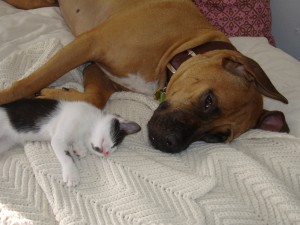 Researchers find that pets may actually help to reduce allergies.
Researchers find that pets may actually help to reduce allergies.
July 13th – children who grow up with a dog in the house may be less likely to develop allergies and respiratory infections later on in life, new research suggests.
Kei Fujimura, PhD, and colleagues, presented their findings on June 19th at the 112th General Meeting of the American Society for Microbiology in San Francisco.
While previous studies have demonstrated that children with pets are less likely to develop asthma, a new study has shed some light on how this may occur – if results in mice apply to people.
Earlier work by Dr. Fujimura and colleagues showed that pet-friendly homes have microbiomes that are much more diverse than pet-free homes, and that some of the bugs could be helpful bacteria, such as ones that help with digestion.
As a follow-up, the researchers aimed to evaluate the link between house dust and respiratory syncytial virus (RSV), a common pathogen that infects children, making them more prone to developing childhood asthma.
In their study, mice were divided into 3 groups. Mice in the first group were fed dust from homes with pets, and were subsequently exposed to respiratory syncytial virus (RSV). Mice in the second group were only infected with RSV, and those in the third group were uninfected.
The animals fed the house dust did not show symptoms of the infection, such as airway swelling, and mucus production. The composition of their gut bacteria was also very different from that of mice who were not exposed to the dust.
Early childhood is a critical time for development of protection against allergies and asthma, and it seems that exposure to pets can be beneficial. The researchers believe that early exposure to allergens can help the immune system to mature more quickly to protect against allergies and asthma.
Now it remains to be determined which of the microbes are responsible for guarding against this infection – information which could be important for the development of therapies to protect against RSV and maybe decrease the risk of childhood asthma.
The recent unveiling of the Human Microbiome Project will hopefully help to make this a reachable goal.
Image credit elemenoperica @morgueFile
Follow Me!